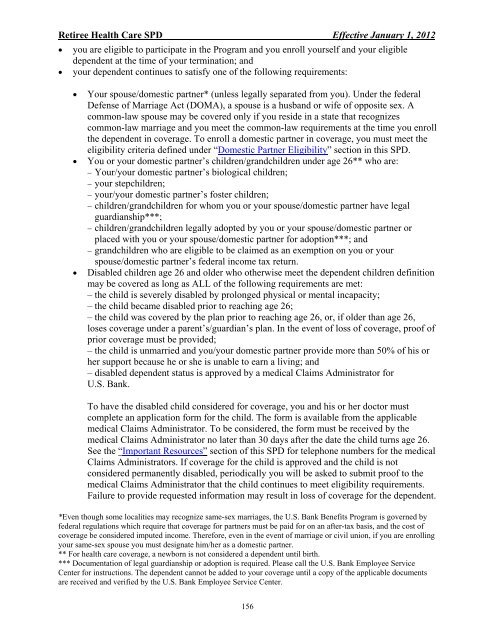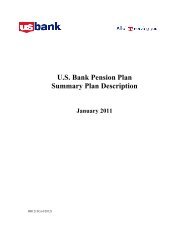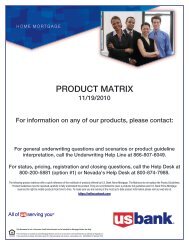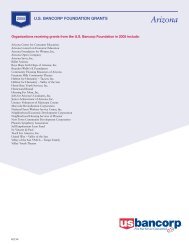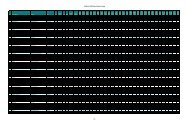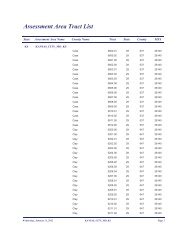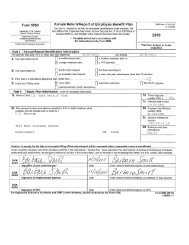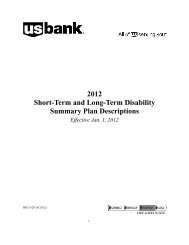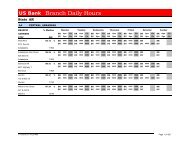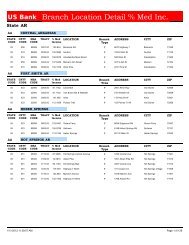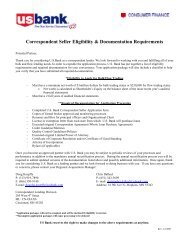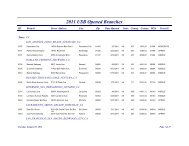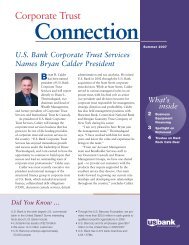The eligibility and enrollment rules for the U
The eligibility and enrollment rules for the U
The eligibility and enrollment rules for the U
Create successful ePaper yourself
Turn your PDF publications into a flip-book with our unique Google optimized e-Paper software.
Retiree Health Care SPD Effective January 1, 2012<br />
• you are eligible to participate in <strong>the</strong> Program <strong>and</strong> you enroll yourself <strong>and</strong> your eligible<br />
dependent at <strong>the</strong> time of your termination; <strong>and</strong><br />
• your dependent continues to satisfy one of <strong>the</strong> following requirements:<br />
• Your spouse/domestic partner* (unless legally separated from you). Under <strong>the</strong> federal<br />
Defense of Marriage Act (DOMA), a spouse is a husb<strong>and</strong> or wife of opposite sex. A<br />
common-law spouse may be covered only if you reside in a state that recognizes<br />
common-law marriage <strong>and</strong> you meet <strong>the</strong> common-law requirements at <strong>the</strong> time you enroll<br />
<strong>the</strong> dependent in coverage. To enroll a domestic partner in coverage, you must meet <strong>the</strong><br />
<strong>eligibility</strong> criteria defined under “Domestic Partner Eligibility” section in this SPD.<br />
• You or your domestic partner’s children/gr<strong>and</strong>children under age 26** who are:<br />
− Your/your domestic partner’s biological children;<br />
− your stepchildren;<br />
− your/your domestic partner’s foster children;<br />
− children/gr<strong>and</strong>children <strong>for</strong> whom you or your spouse/domestic partner have legal<br />
guardianship***;<br />
− children/gr<strong>and</strong>children legally adopted by you or your spouse/domestic partner or<br />
placed with you or your spouse/domestic partner <strong>for</strong> adoption***; <strong>and</strong><br />
− gr<strong>and</strong>children who are eligible to be claimed as an exemption on you or your<br />
spouse/domestic partner’s federal income tax return.<br />
• Disabled children age 26 <strong>and</strong> older who o<strong>the</strong>rwise meet <strong>the</strong> dependent children definition<br />
may be covered as long as ALL of <strong>the</strong> following requirements are met:<br />
– <strong>the</strong> child is severely disabled by prolonged physical or mental incapacity;<br />
– <strong>the</strong> child became disabled prior to reaching age 26;<br />
– <strong>the</strong> child was covered by <strong>the</strong> plan prior to reaching age 26, or, if older than age 26,<br />
loses coverage under a parent’s/guardian’s plan. In <strong>the</strong> event of loss of coverage, proof of<br />
prior coverage must be provided;<br />
– <strong>the</strong> child is unmarried <strong>and</strong> you/your domestic partner provide more than 50% of his or<br />
her support because he or she is unable to earn a living; <strong>and</strong><br />
– disabled dependent status is approved by a medical Claims Administrator <strong>for</strong><br />
U.S. Bank.<br />
To have <strong>the</strong> disabled child considered <strong>for</strong> coverage, you <strong>and</strong> his or her doctor must<br />
complete an application <strong>for</strong>m <strong>for</strong> <strong>the</strong> child. <strong>The</strong> <strong>for</strong>m is available from <strong>the</strong> applicable<br />
medical Claims Administrator. To be considered, <strong>the</strong> <strong>for</strong>m must be received by <strong>the</strong><br />
medical Claims Administrator no later than 30 days after <strong>the</strong> date <strong>the</strong> child turns age 26.<br />
See <strong>the</strong> “Important Resources” section of this SPD <strong>for</strong> telephone numbers <strong>for</strong> <strong>the</strong> medical<br />
Claims Administrators. If coverage <strong>for</strong> <strong>the</strong> child is approved <strong>and</strong> <strong>the</strong> child is not<br />
considered permanently disabled, periodically you will be asked to submit proof to <strong>the</strong><br />
medical Claims Administrator that <strong>the</strong> child continues to meet <strong>eligibility</strong> requirements.<br />
Failure to provide requested in<strong>for</strong>mation may result in loss of coverage <strong>for</strong> <strong>the</strong> dependent.<br />
*Even though some localities may recognize same-sex marriages, <strong>the</strong> U.S. Bank Benefits Program is governed by<br />
federal regulations which require that coverage <strong>for</strong> partners must be paid <strong>for</strong> on an after-tax basis, <strong>and</strong> <strong>the</strong> cost of<br />
coverage be considered imputed income. <strong>The</strong>re<strong>for</strong>e, even in <strong>the</strong> event of marriage or civil union, if you are enrolling<br />
your same-sex spouse you must designate him/her as a domestic partner.<br />
** For health care coverage, a newborn is not considered a dependent until birth.<br />
*** Documentation of legal guardianship or adoption is required. Please call <strong>the</strong> U.S. Bank Employee Service<br />
Center <strong>for</strong> instructions. <strong>The</strong> dependent cannot be added to your coverage until a copy of <strong>the</strong> applicable documents<br />
are received <strong>and</strong> verified by <strong>the</strong> U.S. Bank Employee Service Center.<br />
156


